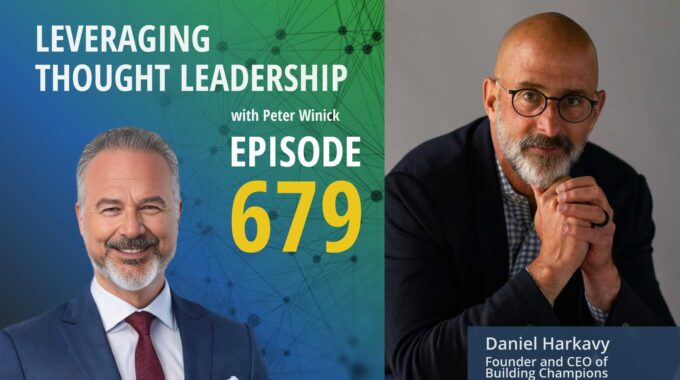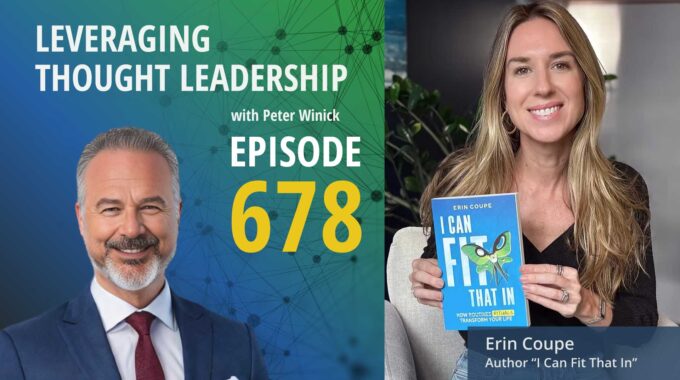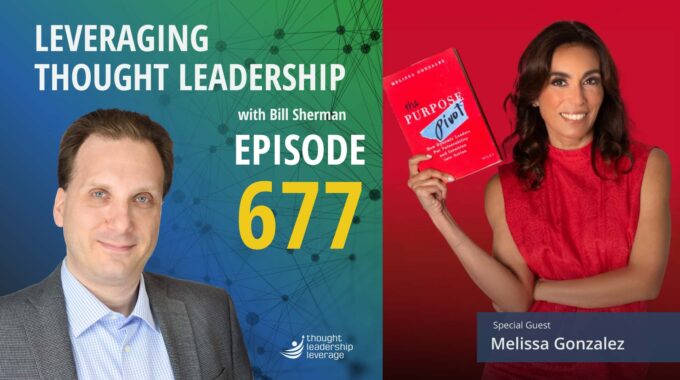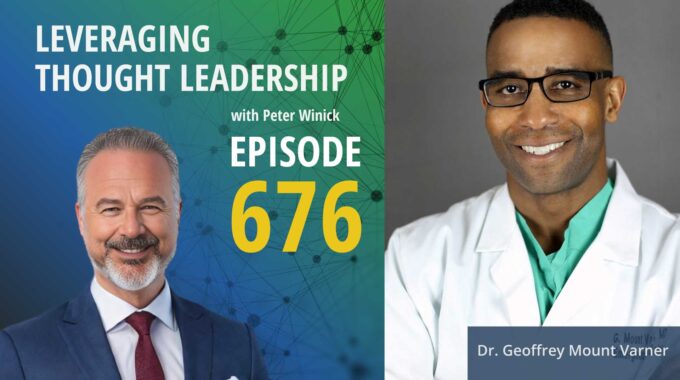A roadmap for leaders who want to multiply their impact — not their workload. This…
The Faith Code at Work: Purpose, Fulfillment, and Legacy | Rusty Rueff
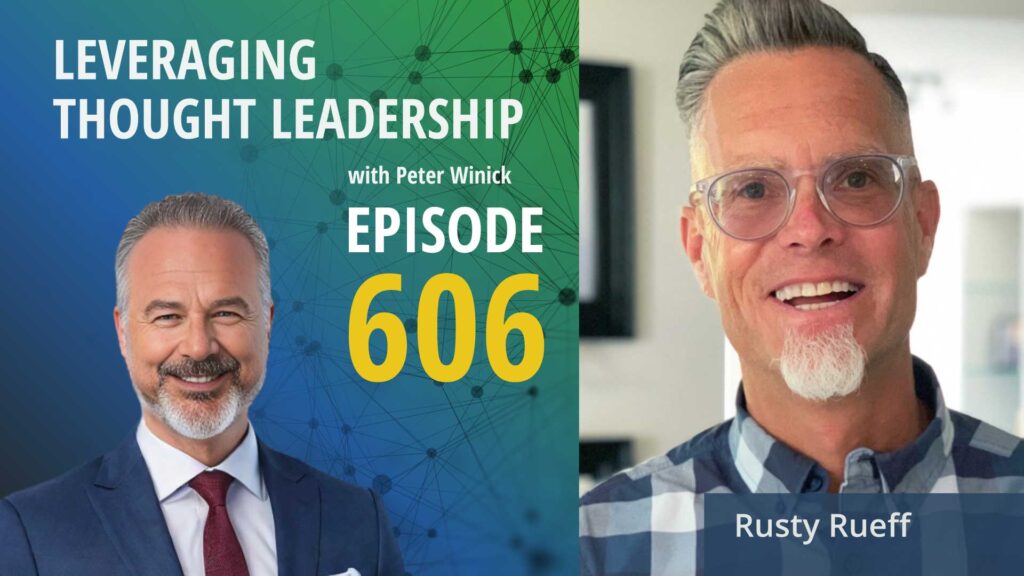
Strengthening Workplace Culture by Embracing Mind, Body, and Spirit
Rusty Rueff joins Peter Winick to discuss the powerful role of spirit in the workplace, urging organizations to support employees’ holistic well-being, including spiritual fulfillment. He shares insights from his book, The Faith Code, challenging listeners to reflect on what truly matters and build lives rooted in purpose and resilience.
What’s the role of spirit in a world driven by bottom lines and business metrics?
Today, Peter Winick sits down with Rusty Rueff, an accomplished investor, startup advisor, Co-Founder and Director at Alioth Talent and previously served under President Obama on his advisory committee for the Arts at the Kennedy Center, to discuss the crucial intersection of purpose and the workplace. Rueff has dedicated his career to empowering organizations and people and shares his belief that modern workplaces must recognize the holistic needs of their people—including the often-overlooked need for spiritual fulfillment.
Historically, work and personal lives were siloed. But today, companies are embracing the importance of physical and mental well-being, with gyms, wellness programs, and mental health support. Rueff believes the next frontier is integrating “spirit” into the workplace—not in a religious sense, but as a core part of personal meaning and motivation. Companies should aim to foster environments where employees feel committed, not just compliant. But how can companies approach this without stepping into sensitive territory? Rueff advocates for open forums and inclusive resource groups that give employees a safe space to bring their full selves to work. By creating these avenues, organizations enable connection and belonging, helping employees build resilience, passion, and purpose.
Rueff’s latest book, The Faith Code: A Future-Proof Framework for a Life of Meaning and Impact, asks readers to explore their foundational beliefs. He challenges listeners to reflect on the “platform of their lives” and what they cherish most deeply. As he explains, while our bodies and minds may wane over time, our spirits have the power to grow stronger—right until the end.
Three Key Takeaways:
The Spirit in the Workplace: Beyond physical and mental health, organizations should support employees’ spiritual well-being, fostering commitment and purpose rather than mere compliance.
Inclusive Spaces for Authenticity: To empower employees to bring their whole selves to work, companies should create open forums and resource groups that celebrate diverse backgrounds and interests, cultivating belonging and connection.
Reflecting on Life’s Platform: Rueff’s concept of the “platform of life” challenges individuals to identify what truly matters and holds lasting value. While physical and mental capacities may fade, nurturing the spirit can build resilience and strength that endures.
Rusty is changing lives by getting people to ask the right questions about their life. When it comes to Thought Leadership are you asking the right questions? Take a moment to check out this article by Peter Winick on Starting with the Problem, Not the Solution. It can make a huge difference in your work!
Transcript
Peter Winick And welcome, welcome, welcome. This is Peter Winick. I’m the founder and CEO at Thought Leadership Leverage. And you’re joining us on the podcast today, which is Leveraging Thought Leadership. And today my guest is an old friend, Rusty Rueff. I usually don’t do this, but I’m actually going to read his bio. I usually kind of rushed through those because they bore me. But Rusty has got such a cool bio that I’m going to I’m going to share with you. So, Rusty, invest in advisors and governance startups. He was appointed by President Obama to his advisory committee for the Arts for the Kennedy Center and was coordinating national co-chair for technology for Obama. Most recently, he served on the founding team of Invest Innovators for Biden. He’s a director of Alley of Talent, a co-founder run coach, Natomas Restaurant Group. He was on the founding boards of Glassdoor and Hirevue. He was the CEO of Snow Cap. I’m going to fast forward through some of this. He’s written a book when it comes to the Grammys, was the chair of the Grammy Foundation in L.A. and he’s got a new manifesto for the human side of business. And then most importantly, Rusty, his wife, Patty and Theo, his French bulldog, reside in Birmingham and Charleston, Rhode Island. So talking about a renaissance man, welcome. Welcome aboard.
Rusty Rueff Rusty. Thank you for your thanks. Thanks. Thanks. I you know, I always I always think about black profiles and stuff. You almost like don’t even want to have one out there. You just want to go. Okay. You know, let’s find out who this guy is. But yeah.
Peter Winick Exactly. So let’s sort of keep to the theme of the podcast, but tell us about your journey. Not through all the, you know, from Grammys to White House and all that, but like, what’s the through line for you as a thought leader? And if we were to sort of do an intellectual archeological dig, let’s get to the start and kind of where it is today, because I think things build on their foundation as it relates to leadership.
Rusty Rueff Yeah. You know, I’d like to think that I have that I’ve got actually thoughts that that other people want to follow and I could actually be thought of as a thought leader now. But I think what there are a couple of places where in my career and upbringing and all of it comes together that I think that I have. I might have something that people look at and go, okay, well, that’s thought leadership. And, you know, I spend a lot of time and southern my back and my background. But, you know, I was at PepsiCo for a lot of years, Electronic Arts for a lot of years doing the capitol stuff. So I H.R. Lots of other functions. And then I got to be a CEO and I got to run all these organizations. As you mentioned, the grammy foundation and theater boards. And, you know, and what I’ve come to Peter is, is that. This whole thing. Not surprisingly when I say this is one big human experience. Right. Right. Our work, our relationships, the things that we spend time on is just one big human experience. Well, let’s.
Peter Winick Stay there a minute, because I think that, you know, you and I are probably about a similar age. When we were coming up. That wasn’t so. Write in was your personal life was personal. Your business life was your business life. Your spiritual life was your spiritual life like. So that’s I mean, we sort of take that for granted today, but that is we’ve been.
Rusty Rueff So No, that’s exactly right. It was very segmented and you and put in silos and in fact you didn’t you didn’t allow for those things to be blended because your work became such a big deal. You know. Yeah. Your self-esteem, your ego, everything was around your work and people didn’t really want you to hear anything about anything outside of your work. And but I think what happened and I will go back, let’s say about 35, 40 years ago, the workplace began to meld in other parts of life. Yep. And started to talk about things like word like balance, which you would never have heard about. Well, if those the 60s, even the 70s. But in the 80s we started to talk about it. And one of the first things that employers started to look at and I and I I’m old enough where you are due to remember was they recognized that well, wait a minute, you bring your whole self to work. And one of the things you bring to work is your body. So your body we’re going to recognize that’s important in your health and your and your fitness are going to be important. And, you know, corporations built gyms and allowed us to go do things and go running on running tracks and, you know, schedule time in our meetings to go do that. And they invested and they said, okay, now you brought your body. And then and in the last 15 years. They started to say, okay, well, I guess we should also pay attention to your mental health and parts of your mind. And so now we let you bring your mind to the workplace and talk about those things. Right. What we’ve not done is we’ve not spent much time on this spirit. So if you think about the platform of our lives as a isosceles triangle, mind, body and spirit, right? We’ve not really looked at that, although in the workplace, we want your spirit to be strong. We want you to be committed and not just compliant. We want you to identify with our mission and our purpose.
Peter Winick Yeah, but. Well, I just. I just want to push on. Even on the mind stuff, I think we do realize people bring their minds to work, their emotions to work and all that other stuff. It’s only the last couple of years, like kind of Covid post-COVID, that mental health is addressed differently in the workplace where it used to be. You know, if you’re to look at employee research services and search for mental health, say, three or 4 or 5 years before Covid, it was really extremes. If somebody came in, you know, going postal or so obviously depressed or drunk or addicted to something, we’d say, my God, what do we do? Like Rusty fell off the ledge, like, okay, let’s call. Now, it’s not that we moved a few standard DBA.
Rusty Rueff We have it.
Peter Winick And I think that. We’ve brought that in, but we haven’t necessarily retrained the old folks like you and I to say, Well, what are the new boundaries here? How do I address if I pick up a cue that, you know your colleague and I think you might be depressed or stressed or something? How do I handle that in an appropriate way? Because, you know, calling out a big meeting, say, hey, Rusty, you look depressed getting married. Not a good idea.
Rusty Rueff Yeah, sadly, that probably happens.
Peter Winick I’m sure it does.
Rusty Rueff Yeah, it does. Because we don’t. We don’t know how to deal with those things. You know, there’s. There’s no one size fits all answer here. But I will say this is the openness to conversation is the thing that’s the most beneficial today. And that’s when someone can actually you don’t have to be like super courageous or super despondent on either end of the spectrum to be able to go in and tell your boss, Hey, listen, I’m feeling really stressed out. Yeah. And we can do that. And you’re correct. I think what’s exacerbated, you know, since post-COVID and I think it’s bothersome, right, that you and I and anybody else can work wherever we want. We want to work. But, you know, it gets it gets a little lonely in here. Yeah. Yeah. Yeah. And we need ability action. And we need ways to you know, some of the best times in my career were those times that, you know, you walked out of a meeting. It was a tough meeting. You walked down the hall and you said, you know, that was tough. What are you doing tonight? And you said one there. Let’s go to happy hour. That’s yeah, that and you’re right. And so we got to we got to watch out for loneliness that turns into helplessness and turns into hopelessness. And we got to have our ears open and our eyes open to those who work for us. But I will just say that I think that, you know, we’re in a much better place. We’re in a much better place. Being open with mind and body. And I hope and I’m encouraged now that people are starting to talk about spirit, because spirit is And the reason I bring this up is because I wrote this book, The Faith Code. And I. And I am so right. Sure. I am so sure that our all being you ask me where the leadership comes from, my that our whole being must have spirit included. And anybody can define what that what’s how their spirit strengthened in their own way.
Peter Winick Let’s stay there a minute. So stay there a minute, because I think this scares the heck out of a lot of folks. Right. Because if we can both identify, quote, faith-based companies. Right. Where they’re really clear, you know, Chick-Fil-A comes to mind, whatever. And it’s not that they’re good or bad or I don’t want to get into all that, but like whatever, they self-identify and make some tradeoffs. From a PNL standpoint to a brand standpoint, this is who we are is what we believe in. And this and that is what we’re about, right? Most companies aren’t that blatant about it, right? So most companies want to say, whoa, whoa, whoa, whoa, okay. Everybody can do whatever their thing is. We probably don’t even need to opine as an organization as to what we believe. So how do you. What what’s the spectrum here from we’re identifying is this whatever this is to welcoming and then even defining spirituality in the workplace because I think just old words the language scarce.
Rusty Rueff You know I remember the word of spirituality is spirit. Yeah. You know so. For me. Peter I think the organizations that do it the best are those ones that provide open forums for people who have different interests, different backgrounds to come together and find that affiliation. Right. So through employee resource groups, through different kinds of networking opportunities to sharing things, you know, on a Slack channel that they belong to that somebody else doesn’t want to belong to, but it’s there if they want to belong to, it is the best way for an organization. I was trying to make was trying to make sure that they that their employees do feel like they can bring their full staffs to work. Like I think I think when it gets difficult is when someone doesn’t feel like they bring their full selves to work. And then when they hit roadblocks and barriers, they don’t have anybody to again affiliate with or they don’t feel like they belong to that organization anymore. And people quit companies. They don’t quit people.
Peter Winick Yeah, that’s right.
Rusty Rueff And if I have a group of people and we all do, you could call it whatever you want to call it. We all found our little tribes inside of companies that were where we were like minded and had no Burton passions. And. And we lead on each other.
Peter Winick Yes.
Rusty Rueff And if we were really lucky, you know, we’ve now law we’ve now long left those companies, but we still have those friends.
Peter Winick Love it. Love it.
Rusty Rueff Those are the one. If you’re enjoying.
Peter Winick If you are enjoying this episode of Leveraging Thought Leadership, please make sure to subscribe. If you’d like to help spread the word about our podcast, please leave a five-star review at ratethispodcast.com/ltl and share it with your friends. We’re available on Apple Podcasts and on all major listening apps as well as at Thought Leadership Leverage dot com forward slash podcast.
Peter Winick What is your home with the book that who do you hope reads it and what do you hope they do differently as a result of being exposed to your ideas? Yeah.
Rusty Rueff So I mean, I’d love for everybody to read it. It’s, I’m sure not everybody is going to. But what I would like you to walk away with. Read it or not read it is we use we use the metaphor of are you building your life as a platform or an app? And I would like everyone to stop and step back and say, you know, what is the platform of my life? My building my life on. Am I building it on mind, body and spirit? Am I building it on values and principles? Am I building on deep relationships that matter?
Peter Winick Just stay there a second, because I think it’s. That’s so well-put. Because oftentimes fall leaders, when I ask them a similar question, they dive deeper into the woods of the change in the metamorphosis. And that as a result of this, I want why to happen. I love that you’re just asking like a great goal for you. And I think an attainable goal is can you just ask the question?
Rusty Rueff That’s right.
Peter Winick Whatever the answer may be, may be right. Like and there isn’t in this case a want to answer. It has to look exactly like my definition and this that the other thing. But you know I think too often just thought leaders we triple click right plus we think well what’s the. How do we shake people out of a trance? And I think the best way to shake people out of a trend is get them to ask a question. Ask them something that like that’s a great question that somebody might have been exposed to, let’s say, at a lunch and learn in the workplace and then over the dinner table with their partner say, you know, I did this thing today. Now, here’s what got me thinking right and exactly that’s yet.
Rusty Rueff And yeah, and if I want to ask another question yourself to try to get to what is that platform? Yeah. You ask yourself the question what are those things that it were taken away from me. By choice, by not my choice. They were taken away from me that I feel like I. It would be such a loss. Well, I know much about that. I want to preserve and protect and always make sure it is my is what my life is built around. Those are your platform aspects. Yeah. Those are those things that when you really get down underneath it and what you find when you talk to yourself in the shower in the morning is ask yourself those questions. Things like your job. You’ll go. Well, you know what? Yeah, I would. Really? Yeah, well, you know what I really don’t like? I don’t really like my job. You know, if I lost it, I could. I could get another one right. I lost my spouse.
Peter Winick Yeah. Yeah.
Rusty Rueff Right. If I lost my health. Right. If I lost my mind. If I lose my spirit. Those things. Those things, if I lose, would be devastating. And those are the things that are those.
Peter Winick And I think that the. The struggle with that as more so as we’re coming up, you know, the ranks and working really hard and so myopic and all that, that we think that an accomplishment like, you know, being awesome at PowerPoint or mastering a room or, you know, all the thinking skills that we develop, they typically are not mentioned in a eulogy, quite frankly, like, wow, Rusty was wow. If you have ever experienced a rusty PowerPoint man, you were reading. You kidding? That’s not what they’re going to talk about. Right. So I think there’s a point. I mean, some of this somewhat Maslow-esque because this, you know, this higher level stuff, like if you don’t have your basics met, if you’re unsafe, if you’re financially not stable, if, if, if, like. Right. When is this. You know, is it a luxury or is this sort of, you know, first world problem or how do you how do you square that circle?
Rusty Rueff No, it is I, I think it is Macedonian, if that’s the right way to say it. Middle and low end in the sense that we all we all are doing it. We’re and we all have it. We’re just not prioritizing. Correct. Right. And so, you know, and I know people who had prioritized as part of their life for as long as, you know, and taking care of their physical well-being. Yeah. They’re going to win out over those who didn’t.
Peter Winick Well, I would say maybe. I mean, there are some of those people that are so extreme egomaniacs that it’s all me, me, me, me, me. And they’re taking care of the physical aspect of their life at the expense of.
Rusty Rueff The balance out of balance because of relationships or the other things that that that matter. I don’t either.
Peter Winick But do the Popeye biceps right.
Rusty Rueff Well let’s call those the edge cases. Okay. That’s right. Well, because, like at the end of at the end of the day, there’s only if I take my mind, body and spirit there, my mind is going to deteriorate and my body is going to deteriorate. Yeah. No matter what we do, we’re going to work hard at it and we’re going to delay it and we’re going to be Mr. Longevity and we’re all going to subscribe to Retire and, you know, we’re going to rock.
Peter Winick Right?
Rusty Rueff No, no. I could with 100% certainty. I’m going to tell you. You’re not going to beat that. Yeah. There is an end. However, at the end of our day, at the last moment of our lives, our spirit. Could be the strongest it’s ever been in our in our lifetime.
Peter Winick Right. So it’s not subject to my Niece Creek and I can’t find that marked user.
Rusty Rueff One of the three is the only thing that can get there while everything else decreases. I learned that. And that’s our in our spirit. You know, again, wherever it comes from, it’s a platform thing. It’s a one thing that that we can count on. And, you know, and you and I right now, again, we are old enough that we have either had to either have parents or friends of our parents or other people. And there’s a couple of different ways people go out of this desert. There are those that go out of this earth angry. Yeah, responded. Depressed. I never got there. It didn’t work out. And then there are the people who go out of this world going, you know what? What a heck of a life. Right. And yesterday was a great day. And today is going to be another great day all the way to the end. I want to be the latter.
Peter Winick Love it. Well, I appreciate your time. This has been awesome. Just a fun conversation. And I always learn a couple of things when you and I have an opportunity to have a chat. So thank you for coming on today, Rusty.
Rusty Rueff Thank you, Peter. Great to talk to you.
Peter Winick To learn more about Thought Leadership Leverage, please visit our website at thoughtleadershipleverage.com to reach me directly. Feel free to email me at Peter at thoughtleadershipleverage.com and please subscribe to leveraging thought leadership on iTunes or your favorite podcast app to get your weekly episode automatically.


